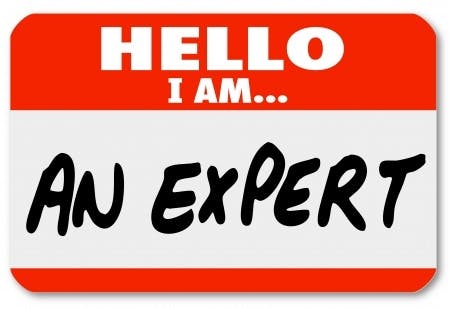“In the land of the blind, the one-eyed man is King” — Erasmus of Rotterdam
I love quotes, but sometimes one comes across that you have not heard of and it is all too powerful. My interpretation is even someone without much talent or ability is considered special by those with no talent or ability at all.
I had a conversation a few weeks back from a young professional that I mentor. On her LinkedIn page, she listed herself as a “PR expert.” Two years into her career and she was already an expert. How did that happen?
Well it happens a lot. All over the Internet, I am amazed by all the experts, gurus and ninjas. It is great that we have so many experts in the land of the blind. My question is, where do we go to get certified as an expert?
So finally I asked her: who anointed you an expert? She could not accurately respond and she knew she had to remove it from her LinkedIn profile.
So,that made me the expert police. If that was my real job, I would be working 24/7 because the Internet is infested with experts in the land of the blind.
Self-branding: Be careful
I have a big problem with this anointing thing. I’m always troubled when I see people who self-brand themselves as an authority or an expert. They all use these pseudonyms that mask themselves as experts.
An expert, to me, means that you have discovered everything that there is to know about a given topic. Everything!
So based on that criteria, there are not that many people on the planet who would fit that description. Sure, a person’s level of knowledge may far surpass others in their industry, but an “expert” is a strong label that gets badly overused.
Any time you approach your career or discipline as an expert you have closed the door on learning. Going to the doctor, he gives you a prognosis; research the topic to make sure you are knowledgeable on your ailment. Never take any pronouncement as fact. Always do your own research no matter what.
Over the years I have developed an anti-expert bias. Sure, I write a blog on TLNT and post others elsewhere, but by no stretch of the imagination would I consider myself an expert. Each and every day I explore HR by reading a minimum of four (4) articles, but by the standards of true “expert,” I do not read much at all.
I had a conversation with a top consultant recently, and I said I wanted to share an article that I had recently read. His response? “I do not read this stuff. I deal with it every day and that is the last thing I want to read.” My interpretation was that he was an “expert in the making.”
Think about doctors; they practice medicine even after all those years of studying and certification. They practice to become better. They must re-certify over a specific time frame to keep their certification.
What is their MO?
How can you identify “experts” and whether they have already self-identified? They are the ones who use phrases like:
- “Because I said so.“
- “I have been in this business for XX amount of years.”
- “My way or the highway.”
In other words, they use every opportunity to show you how superior they believe they are to you.
I had a friend who was recently promoted to VP and he immediately became the “expert” because he assumed that, with the NEW title, he had to come off as that.
In a meeting with his team, one team member challenged his assumption on a project and my VP friend refused to listen to him. As he told the story, his response was that, “I am the one that has the two initials after my name, and until he gets those initials, I will not listen to anything that he says.”
Being an expert isn’t telling other people what you know. It’s understanding what questions to ask, listening to other ideas, and collaboratively applying your knowledge to the specific situation at hand.
Yes, being an expert means more than telling what you know — it means listening to others and providing sensible direction.
Who really is the smartest in the room?
Many of us go to conferences, and each speaker at each conference that comes up can be viewed in a lot of cases as the “expert.” Surely they are learned in their profession, and hopefully, learning more each and every day.
When I facilitate a conference session, I always walk away with more knowledgeable resulting from the interaction in the room. The interactions and thoughts from the audience make me a lot smarter — and I am the one that led the session.
I read an article recently on expert witnesses and how that had become an industry within itself, but what came through was that a lot of these folks had basically quit their profession and are now hired out as “experts.”
There are consulting firms that will aid you in your search for an expert. However, this article also said that some of these folks were no longer working [learning] because it was so lucrative to have been labeled as an “expert” that they had no need to toil in the weeds any longer.
So, the next time you see that label — expert, ninja, guru or whatever — remember, always, that they are just like us. Maybe they are more knowledgeable, but maybe not.
Remember, we can call ourselves anything we want, but whether we measure up as an “expert” in the land of the blind is another question altogether.
